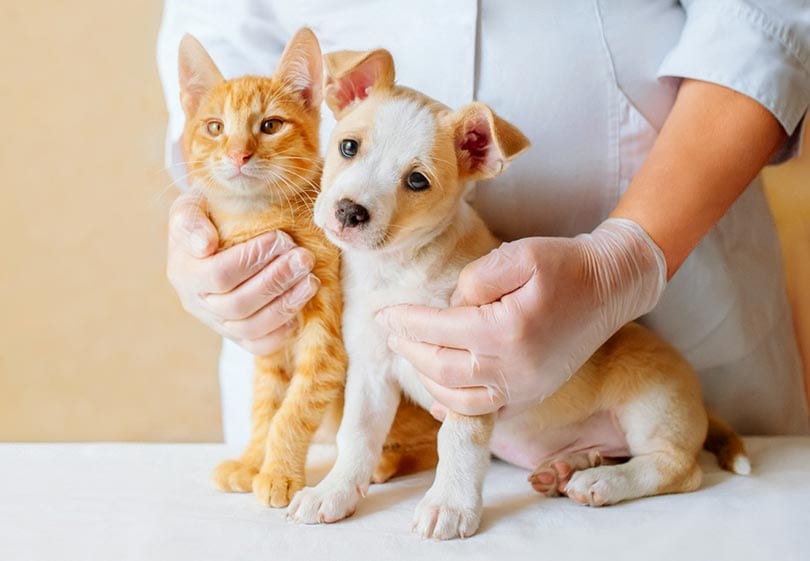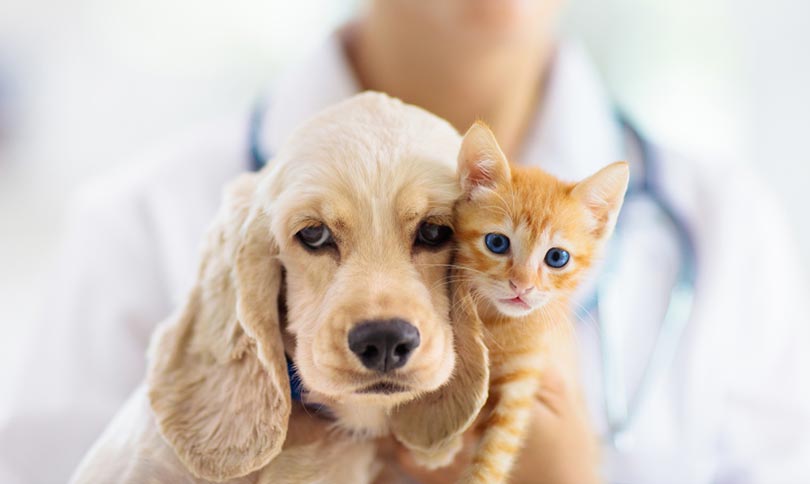How Much Does Pet Insurance Cost in Illinois? 2024 Update
By Jessica Kim
Updated on

Click to Skip Ahead
Many factors affect pet insurance prices, and geographical location is one of the things that influence prices. In general, larger cities with higher living costs will have more expensive insurance premiums than rural towns. So, in Illinois, you can expect to see varying prices based on where you live.
In general, you can expect pet insurance in Illinois to cost around $45 per month for dogs and $24 for cats. However, you may encounter more expensive premiums depending on your pet’s breed and age. We’ll cover all the different factors that affect pet insurance costs in Illinois so that you can have realistic expectations when you start shopping around.
The Importance of Pet Insurance
While pet insurance may not seem like a necessary pet care expense, it’s projected to become more prevalent and normalized in the near future. As the quality of life of pets increases, their average lifespans also lengthen. With age, pets are more susceptible to developing chronic conditions, such as arthritis, cancer, and diabetes.
Veterinary care costs are also rising in the US and can leave pet owners in tough situations where they may receive a bill for a quick MRI scan that costs thousands of dollars. So, with the rise of veterinary care costs, the longer lifespan of pets, and several other factors, pet insurance is becoming more reasonable and budget-friendly than paying for costs out of pocket.
How Much Does Pet Insurance Cost?
Along with geographical location, your pet’s age and breed also affect pet insurance prices. Senior dogs generally have the most expensive premiums, and kittens have the cheapest premiums.
Breeds known to have more genetic health concerns will also have higher rates. For example, brachycephalic pets, like French Bulldogs and Persian Cats, will have more expensive prices than most mixed breeds.
Some pet insurance companies will allow customers to make customizations to their plans by providing options for reimbursement rates, annual limits, and deductible amounts. Premiums typically increase with higher reimbursement rates, lower deductibles, and higher annual limits.
Here’s a breakdown of premium prices of accident and illness plans you can expect in different places in Illinois:
| 4-Year-Old Mixed Breed Dog | 2-Year-Old French Bulldog | 4-Year-Old Mixed Breed Cat | 2-Year-Old Persian | |
| Carbondale | $32 | $55 | $17 | $20 |
| Chicago | $46 | $97 | $26 | $29 |
| Peoria | $37 | $65 | $21 | $20 |
| Springfield | $38 | $70 | $19 | $23 |
Source: https://www.petinsurancequotes.com/pet-insurance/illinois/
Top-Rated Pet Insurance Companies
Types of Pet Insurance Plans
Pet insurance companies offer three main pet insurance plans:
- Wellness plan
- Accident-only plan
- Accident and illness plan
Standalone wellness plans aren’t offered by many pet insurance companies. They cover routine care costs, like vaccines, flea and tick medication, and annual visits. These plans tend to be pretty cheap because the type of care your pet will receive won’t be as extensive. Many pet insurance companies will offer a wellness rider or add-on option to a more robust plan for an additional price so that you can get more comprehensive coverage.
Accident-only plans are another cheap option. These plans only cover expenses related to an accidental injury, such as a broken bone and swallowing indigestible objects. Pet owners with young and healthy pets will typically opt for an accident-only plan because the chances of their pets developing a chronic illness are lower than with older pets.
Accident and illness plans are the most common pet insurance plans. Along with covering veterinary care costs related to accidents, you can also expect to receive coverage for the following items:
- Diagnostic testing
- Treatment for long-term illnesses
- Medication
- Surgeries
Some pet insurance companies provide more expansive coverage and may help pay for dental care, hereditary conditions, alternative therapies, prescription foods, and treatment for behavioral issues.
How Does Pet Insurance Work?
Pet insurance companies operate through claims and reimbursements. After you’ve paid your deductible, you can start to submit reimbursement claims. Once you receive a medical bill from your vet, you’ll usually have to pay out of pocket. Then, you’ll submit a claim to your pet insurance company. If the items on the bill fall under your plan’s coverage, you’ll receive a reimbursement. Some reimbursements can take up to 30 days to arrive.
There are a handful of pet insurance companies that have direct payment options set up. So, instead of paying out of pocket, the company will pay for bills upfront. However, this service is usually only available for participating veterinary clinics. So, you’ll have to check to see if your vet is enrolled to receive direct payments from a pet insurance company.
Pet insurance companies also have different policies on reimbursement rates and annual limits. The average reimbursement rate that companies offer is 80%, but you can even find some that have 100% reimbursement rates.
It’s also important to be mindful of annual limits. Some annual limits are as low as $3,000, while other companies have no annual reimbursement limits. Typically, older pets benefit from plans with higher annual limits, since more medical expenses are expected.
What Doesn’t Pet Insurance Cover?
Pet insurance companies don’t have plans that cover every single item related to your pet’s medical care. They won’t help pay for the following:
- Pre-existing conditions
- Preventable injuries or illness
- Injuries or illnesses caused by abuse or neglect
A pre-existing condition consists of an illness that your pet already has before applying for pet insurance. Your pet can still enroll in a plan, but you can only receive reimbursements for services unrelated to the pre-existing condition. However, if your pet’s pre-existing condition is curable and your pet remains symptom-free for a year, some companies will remove that pre-existing condition from your pet’s record.
In very rare cases, you can find companies that help cover expenses related to breeding, pregnancy, and whelping. Some will also help pay for boarding costs and pet lost and found kits. So, it doesn’t hurt to ask companies what their special riders are if you’re interested in getting a more comprehensive plan for your pet.
When Should I Get Pet Insurance?
Since accidents and illnesses are unpredictable, it’s better to get pet insurance sooner than later. You can find a good amount of highly customizable pet insurance plans, so you’ll be able to find one that offers the right amount of coverage at the most affordable price. You don’t always have to start out with a comprehensive plan.
Pet insurance companies also have waiting periods that must pass before you can submit claims for certain medical services. For example, many plans have waiting periods for hip and joint issues that can be several weeks or months long. So, even if your pet is enrolled in a plan, it won’t receive coverage for these types of issues until the waiting period ends.
Pet insurance plans help with budgeting and anticipating pet care costs, and it also encourages many pet owners to be more responsible with their pet’s medical care. Since pet owners are already paying a premium, they’re more likely to go to the vet.
Some pet insurance companies offer additional perks like reward programs. You can also find a few that will reduce your deductible amount if you have a year without any claims. Some companies will offer their customers a complimentary 24/7 telehealth vet line for emergencies and consultations.
Conclusion
When it comes to pet insurance in Illinois, location plays a role in affecting premium prices. Larger towns and cities tend to be more expensive, and Chicago has one of the highest rates.
While pet insurance can help immensely with budgeting, there’s no denying that it can be a significant monthly expense. So, it’ll be helpful to have a discussion with your vet about anticipated medical costs that are specific to your pet. Knowing what to expect can help you avoid expensive plans that cover items that you probably won’t need and pick a more appropriate and affordable plan.
Featured Image Credit: Rawpixel.com, Shutterstock









